Frankfurt am Main (Germany Hesse)
Cruise Port schedule, live map, terminals, news
Region
Europe Rivers
Local Time
2025-04-13 20:23
 58°F
58°F 14.6°C

 Gentle breeze
Gentle breeze4.2 m/s
 66 °F / 19 °C
66 °F / 19 °C 47 °F / 9 °C
Port Frankfurt am Main cruise ship schedule shows timetable calendars of all arrival and departure dates by month. The port's schedule lists all ships (in links) with cruises going to or leaving from Frankfurt am Main, Germany Hesse. To see the full itineraries (ports of call dates and arrival / departure times) and their lowest rates – just follow the corresponding ship-link.
| Day | Ship | Arrival | Departure |
|---|---|---|---|
| 1 April, 2025 Tuesday | 09:00 | 15:00 | |
| 3 April, 2025 Thursday | 07:00 | ||
| 4 April, 2025 Friday | 21:00 | ||
| 6 April, 2025 Sunday | 09:00 | 15:00 | |
| 11 April, 2025 Friday | |||
| 11 April, 2025 Friday | 09:00 | 01 Jan, 02:00 | |
| 13 April, 2025 Sunday | 15:00 | 18:00 | |
| 13 April, 2025 Sunday | 18:00 | 18:00 | |
| 18 April, 2025 Friday | |||
| 18 April, 2025 Friday | |||
| 19 April, 2025 Saturday | 13:00 | 19:00 | |
| 22 April, 2025 Tuesday | |||
| 25 April, 2025 Friday | |||
| 25 April, 2025 Friday | 15:00 | ||
| 27 April, 2025 Sunday | 15:00 | 18:00 | |
| 30 April, 2025 Wednesday | 09:00 | 15:00 |
Frankfurt is a Main River cruise port and city in Germany's Hesse state (Urban district). By population (around 0,77 million) the city is ranked Hesse's biggest and Germany's 5th-largest (after Berlin, Hamburg, Munich, Cologne. By metro population (over 5,6 million) it is ranked Germany's 4th-largest metropolis (after Hamburg, Berlin, Rhine-Ruhr). EU's geographic center is located approx 40 km (25 mi) east of Frankfurt. The city's namesake is the smaller German city Frankfurt-Oder (Brandenburg state, on Oder River).
Frankfurt is Europe's most important financial centre. Here are the headquarters of Deutsche Bank, Deutsche Bundesbank, European Central Bank, DZ Bank, Commerzbank, the Frankfurt Stock Exchange. The Messe Frankfurt trade fair is one of the world's largest. Other famous worldwide fairs are the Frankfurt Motor Show (world's largest) and the Frankfurt Book Fair (also world's largest). The city has renowned universities (Goethe University, University of Applied Sciences), numerous museums (including Senckenberg Natural Museum, Stadel, Goethe House, Schirn), botanical gardens (including the Palmengarten - Germany's largest).
According to a ranking list by the University of Liverpool in 2001, Frankfurt is the richest European city by GDP per capita. Next in line are Karlsruhe, Paris, Munich. On the other hand, Frankfurt consistently features Germany's highest level of crime per 100,000 inhabitants and is therefore dubbed the "crime capital" of Germany. However, the statistic is often criticized as it ignores very important factors: it is calculated based on administrative 680,000-inhabitant figure but the urban area has 2.5M inhabitants. On weekdays it adds another million people, not to count the 53M passengers passing each year through the airport.
Frankfurt-Oder
Frankfurt-Oder (aka Frankfurt an der Oder) is an Oder River cruise port and city in Germany's Brandenburg state, with population around 60,000. The town is located on the Germany-Poland border, approx 80 lm (50 mi) east of Berlin (Germany's capital). Until 1945, SÅubice (Poland) was also part of Frankfurt-Oder.
The settlement was established as a Polish village (named Zliwitz) in the early-13th century. During the Thirty Years War (1618-48), in April 1631 in Frankfurt an der Oder fought Konungariket Sverige (Kingdom of Sweden / 1611-1721) and Heiliges Romisches Reich (Holy Roman Empire / 800-1806). After a 2-day siege, the Swedish troops entered the town and destroyed most of its buildings.
Frankfurt-Oder became part of Germany (Prussia's Brandenburg province) in 1815, following the Napoleonic Wars (1803-15). Due to its central location in Prussia (between Berlin and Posen (Poznan) and Oder River's increased shipping traffic, Frankfurt developed as a major riverport and had Germany's second-largest annual fair (following only the fair in Leipzig). The current-day city is served by the Berlin-Warsaw Express railway with regular train connections to Magdeburg and Cottbus.
- Cruise Industry
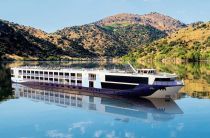
TUI River Cruises expands fleet with high-capacity TUI Ria, sailing Rhine & Moselle in 2026
TUI River Cruises has introduced a newly refurbished ship, set to join its fleet as the highest-capacity vessel yet, ready to sail the Rhine and...
October 25, 2024 - Cruise Industry

TUI River Cruises expands fleet with launch of refurbished TUI Ria in 2026
TUI River Cruises is set to expand its fleet in the summer of 2026 with the introduction of TUI Ria, a newly refurbished vessel designed for enhanced...
October 22, 2024 - Cruise Industry

A-Rosa Cruises welcomes newest ships ALEA and CLEA
Last weekend marked the inaugural voyages of A-ROSA Cruises' newest fleet members - A-ROSA ALEA (fka Avalon Affinity) and A-ROSA CLEA (fka Avalon...
April 14, 2024 - Cruise Industry
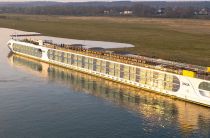
SAGA Cruises to introduce new riverboat (Spirit of the Moselle) in 2025
SAGA Cruises is set to enhance its river cruise offerings with the introduction of a newbuild boat in July 2025 - Spirit of the Moselle...
February 19, 2024 - Cruise Industry
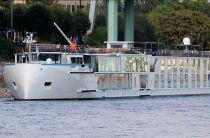
Uniworld to operate “Super Ships” S.S. Victoria and S.S. Elisabeth (fka Crystal Bach and Crystal...
Uniworld Boutique River Cruises has secured a 3-year deal to charter the former Crystal Bach and Crystal Mahler boats, which will be rebranded as...
October 12, 2023 - Cruise Industry
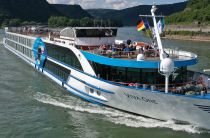
VIVA Cruises launches third riverboat VIVA ENJOY
The Scylla-owned river cruise brand VIVA Cruises/fleet is set to launch its third newbuild riverboat - VIVA Enjoy, in September 2024. VIVA Enjoy will...
June 1, 2023 - Cruise Industry
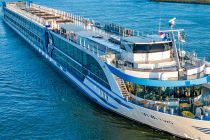
VIVA Cruises to christen VIVA Two riverboat in March 2023
Scylla's luxury river cruise travel brand VIVA Cruises (fleet) announced the expansion of its 2nd build ship, MS VIVA Two, in 2023. Following the...
December 15, 2022 - Cruise Industry

VIVA Cruises' first new build ship VIVA ONE begins Rhine and Moselle sailings
After her May christening, VIVA Cruises’ first newbuild riverboat - MS VIVA ONE, started itineraries on the Moselle and Rhine rivers. To...
May 8, 2022 - Cruise Industry
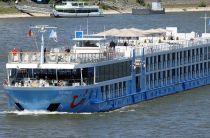
TUI River Cruises UK celebrates the maiden voyage of TUI Isla ship
TUI Isla (fka TUI Allegra) - the 3rd and final riverboat to join TUI River Cruises' fleet, began her Maiden Voyage (Rhine Explorer 2 itinerary) after...
April 4, 2022 - Cruise Industry
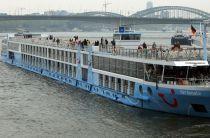
TUI River Cruises restart on March 28 aboard the newly-launched TUI Skyla
TUI River Cruises' sailings will restart at the end of March 2022 after winter trips were suspended during the emergence of the COVID Omicron variant...
January 10, 2022 - show more news
